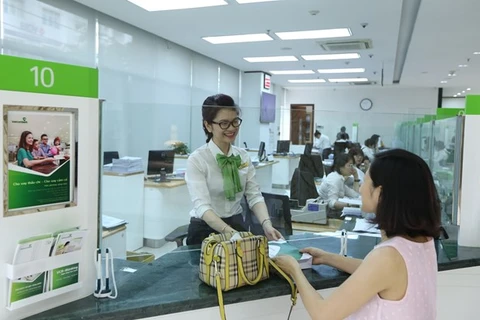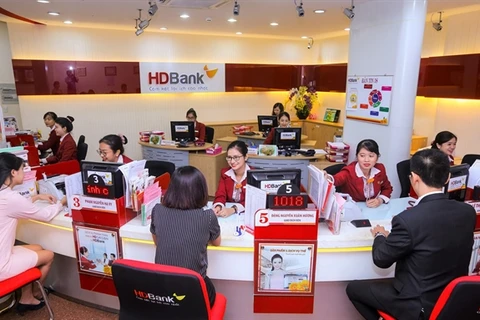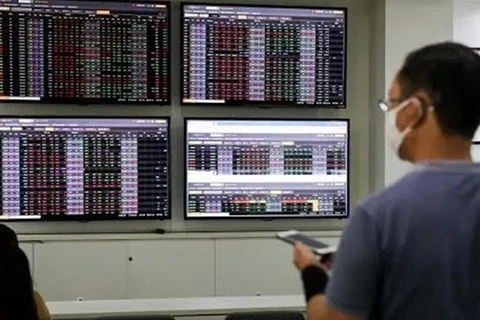Hanoi (VNS/VNA) - The Vietnamese economy recovered more slowly than the world economy last year, but the reverse is likely to be true this year.
BIDV Chief Economist Can Van Luc made the forecast at the conference “Vietnam financial market 2021 and outlook 2022” on May 25.
Luc had three possible scenarios for the Vietnamese economy in 2022. In the best-case scenario, the economy is expected to rebound strongly with an annual growth rate of 6-6.5 percent.
The figure is adjusted down to 5.5-6 percent in the base-case scenario, and to 4.5-5 percent if things do not turn out well. Meanwhile, inflation is believed to rise steadily due to global inflationary pressures.
“I’m quite sure that Vietnamese inflation will rise to around 3.8-4.2 percent this year. It’s inevitable amid rapid-rising global inflation,” he added.
Additionally, Luc was optimistic that the securities market is likely to become more sound and stable after several corrections. The VN-Index is forecast to rise slightly by 7.7 percent to reach 1,614 points in the best-case scenario.
Regarding the banking system, credit growth is expected to hit 14-15 percent while the non-performing loan ratio would be kept at around 2 percent. Pre-tax profits of credit institutions are estimated to grow by 20-25 percent against 2021.
The insurance market is also expected to do well in 2022 profit-wise with a growth of 18-20 percent. However, profits from investment activities are likely to stay lower than in 2020 and 2021.
Economic expert Le Xuan Nghia believed that the corporate bond market is a capital-raising channel more important than medium- and long-term bank loans. It is the case because corporate bonds are more flexible than bank loans.
"When bonds mature, firms can issue new bonds to service the due bonds. They can not do the same for bank loans," he explained.
The expert feared that the currently-stagnated bond market would hold back ongoing bond-financed projects and stifle new projects, putting firms at risk of defaults.
He was also concerned that the stagnation would freeze the realty market and drive many banks to a critical situation. He called for transparency and accountability in the bond market to solve the problem.
Pham Xuan Hoe, Secretary-General of Vietnam Financial Leasing Association, estimated total financial assets in the economy at over 300 percent of GDP. The ratio was so high that it signalled a structurally-problematic real economy.
"Such a high ratio is the main cause for turbulence in Vietnamese financial markets in recent years," he said.
The secretary-general also highlighted asset leasing as an effective financial channel for firms, notably small- and medium-sized businesses. However, legal frameworks for the channel have been outdated and need to be replaced to unlock its potential.
Pham Thi Hoang Anh, Director of Research Institute for Banking, Banking Academy of Vietnam, opined that the State Bank of Vietnam had managed central exchange rates with much success. Notably, foreign reserves reached 114 billion USD by late 2021.
"The abundant reserves will give SBV ample room to safeguard financial security," she said.
The director also revealed that total credit to commercial real estate hit 783 trillion VND by late March 2022, higher than the same period in previous years but still in the safe zone.
Vu Nhu Thang, Vice Chairman of the National Financial Supervisory Commission, was concerned that risks in the realty market might spill over into the banking system and securities market, putting firms on the line.
“The size of the contagion effects depends on the volume of the privately-placed bonds issued by realty firms and the volume of those held by banks,” he stressed.
He also underlined Circular 16 issued by the SBV in 2021 as a timely regulation that constrained banks’ privately-placed bond ownership, effectively curbing the spillover./.
BIDV Chief Economist Can Van Luc made the forecast at the conference “Vietnam financial market 2021 and outlook 2022” on May 25.
Luc had three possible scenarios for the Vietnamese economy in 2022. In the best-case scenario, the economy is expected to rebound strongly with an annual growth rate of 6-6.5 percent.
The figure is adjusted down to 5.5-6 percent in the base-case scenario, and to 4.5-5 percent if things do not turn out well. Meanwhile, inflation is believed to rise steadily due to global inflationary pressures.
“I’m quite sure that Vietnamese inflation will rise to around 3.8-4.2 percent this year. It’s inevitable amid rapid-rising global inflation,” he added.
Additionally, Luc was optimistic that the securities market is likely to become more sound and stable after several corrections. The VN-Index is forecast to rise slightly by 7.7 percent to reach 1,614 points in the best-case scenario.
Regarding the banking system, credit growth is expected to hit 14-15 percent while the non-performing loan ratio would be kept at around 2 percent. Pre-tax profits of credit institutions are estimated to grow by 20-25 percent against 2021.
The insurance market is also expected to do well in 2022 profit-wise with a growth of 18-20 percent. However, profits from investment activities are likely to stay lower than in 2020 and 2021.
Economic expert Le Xuan Nghia believed that the corporate bond market is a capital-raising channel more important than medium- and long-term bank loans. It is the case because corporate bonds are more flexible than bank loans.
"When bonds mature, firms can issue new bonds to service the due bonds. They can not do the same for bank loans," he explained.
The expert feared that the currently-stagnated bond market would hold back ongoing bond-financed projects and stifle new projects, putting firms at risk of defaults.
He was also concerned that the stagnation would freeze the realty market and drive many banks to a critical situation. He called for transparency and accountability in the bond market to solve the problem.
Pham Xuan Hoe, Secretary-General of Vietnam Financial Leasing Association, estimated total financial assets in the economy at over 300 percent of GDP. The ratio was so high that it signalled a structurally-problematic real economy.
"Such a high ratio is the main cause for turbulence in Vietnamese financial markets in recent years," he said.
The secretary-general also highlighted asset leasing as an effective financial channel for firms, notably small- and medium-sized businesses. However, legal frameworks for the channel have been outdated and need to be replaced to unlock its potential.
Pham Thi Hoang Anh, Director of Research Institute for Banking, Banking Academy of Vietnam, opined that the State Bank of Vietnam had managed central exchange rates with much success. Notably, foreign reserves reached 114 billion USD by late 2021.
"The abundant reserves will give SBV ample room to safeguard financial security," she said.
The director also revealed that total credit to commercial real estate hit 783 trillion VND by late March 2022, higher than the same period in previous years but still in the safe zone.
Vu Nhu Thang, Vice Chairman of the National Financial Supervisory Commission, was concerned that risks in the realty market might spill over into the banking system and securities market, putting firms on the line.
“The size of the contagion effects depends on the volume of the privately-placed bonds issued by realty firms and the volume of those held by banks,” he stressed.
He also underlined Circular 16 issued by the SBV in 2021 as a timely regulation that constrained banks’ privately-placed bond ownership, effectively curbing the spillover./.
VNA


























